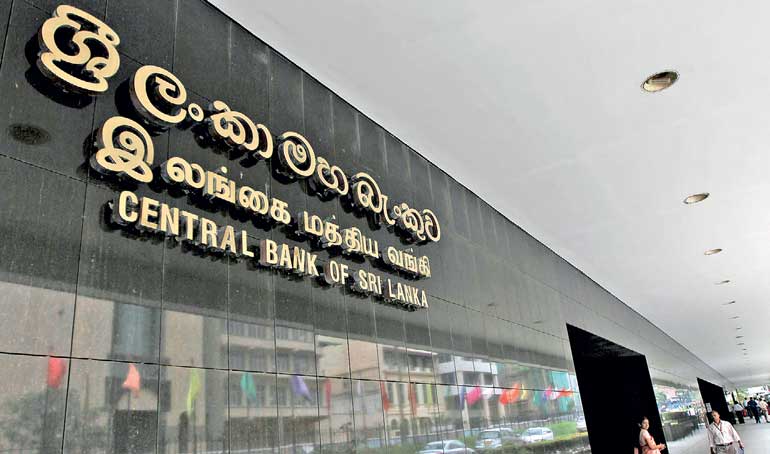Saturday Feb 21, 2026
Saturday Feb 21, 2026
Tuesday, 29 June 2021 01:50 - - {{hitsCtrl.values.hits}}

The present Government decided to scrap the CBSL Bill in conjunction with its recent decision to postpone the fiscal policy targets stipulated in the Fiscal Management (Responsibility) Act of 2003 until the year 2030. These two decisions pertaining to fiscal and monetary policies are likely to have grave repercussions on the country’s macroeconomic stability, which is already in bad shape
 A few days ago, the Government scrapped the Central Bank of Sri Lanka (CBSL) Bill, which aimed at repealing the existing 70-year-old Monetary Law Act with a view to transforming the CBSL into a more independent monetary authority, while putting in place measures to improve transparency and accountability.
A few days ago, the Government scrapped the Central Bank of Sri Lanka (CBSL) Bill, which aimed at repealing the existing 70-year-old Monetary Law Act with a view to transforming the CBSL into a more independent monetary authority, while putting in place measures to improve transparency and accountability.
Strengthening the institutional framework of the CBSL through this Bill, along with fiscal reforms, was a key component of the structural adjustment programme envisaged by the previous Government under the Extended Fund Facility (EFF) agreement entered into with the International Monetary Fund (IMF) for the three-year period, 2016-2019.
The present Government decided to scrap the CBSL Bill in conjunction with its recent decision to postpone the fiscal policy targets stipulated in the Fiscal Management (Responsibility) Act of 2003 until the year 2030, as I elaborated in the last week’s column (https://www.ft.lk/columns/Fiscal-policy-corrections-postponed-until-2030-defying-IMF-support/4-719478).
These two decisions pertaining to fiscal and monetary policies are likely to have grave repercussions on the country’s macroeconomic stability, which is already in bad shape.
CBSL’s roadmap for reforms abandoned
Maintenance of macroeconomic stability, specifically price stability, being the key role of the CBSL, the Bill had recognised the Central Bank as an autonomous body, and provided legislative powers to shield itself from any influence or interference.
As per the new Bill, the present monetary targeting framework was to be replaced with an inflation targeting monetary policy framework so as to prohibit excessive money supply growth arising from Government borrowings.
The CBSL adopted a comprehensive roadmap in 2017 scheduling to enact the CBSL Bill in 2019, and to implement the inflation targeting monetary policy framework in 2020. This roadmap is now abandoned.
Former CBSL Governor Dr. Indrajit Coomaraswamy, with the assistance of the then Deputy Governor Dr. Nandalal Weerasinghe, played a pivotal role in pursuing the path-breaking reforms.
Central bank independence crucial for economic stability
Central bank independence refers to freeing the monetary authority from direct government influence so as to enable it to focus on price and economic stability, rather than adopting populist policies to satisfy the voters according to whims and fancies of the ruling political party.
It is widely recognised that a sufficiently high level of central bank independence is desirable to achieve the major objectives of the central bank, namely price stability and financial stability.
One could raise the question why the central bank should be independent? Why can’t it function just like any other government department? The answer is that independence is essential to insulate the central bank from counter-inflationary biases of the government. Politicians generally prefer to boost output, employment and social welfare in the short run for the purpose of winning elections.
This results in an increase in government expenditure and an expansion of the budget deficit in the absence of a concomitant increase in tax revenue. As a means to finance the budget deficit easily, the government can use the central bank’s power to print fiat money which does not require any backing of reserves.
CBSL’s autonomy recognised in the new Bill
The present MLA does not have any clause with regard to the independence of the CBSL.
In contrast, Section 5 of the new Bill recognises the CBSL as an autonomous body. It states, “The autonomy of the Central Bank shall be respected at all times and no person or entity shall cause any influence to the members of Governing Board, Monetary Board and Executive Board or its employees in the exercise, discharge and performance of their powers, functions and duties under this Act or interfere with the activities of the Central Bank.”
Proposed changes in governance structure
In order to provide greater independence to the CBSL, the new Bill proposed to introduce three Boards instead of the single Monetary Board currently in operation under the MLA. They are (a) Governing Board to be in charge of administration and management of CBSL, (b) Monetary Policy Board, which is responsible for formulation of monetary policy and implementation of a flexible exchange rate system in line with the flexible inflation targeting framework, and (c) Executive Board to be in charge of day-to-day operations of CBSL.
The new Bill restricted the President’s sole power in appointing the Governor of CBSL. Accordingly, the President, with the concurrence of the Constitutional Council, appoints the Governor and the members of the Governing Board and experts of the Monetary Policy Board.
Money printing under MLA for deficit finance
In terms of the present MLA, the CBSL can provide credit to the Government by (a) purchasing Treasury bills from the primary market, (b) purchasing Treasury bonds, and (c) granting provisional advances to the Treasury. Such lending ends up as CBSL’s net credit to the government (NCG) on the asset side of its balance sheet.
NCG together with Net Foreign Assets (NFA) held by CBSL form the monetary base or high-powered money, which is reflected as notes and coins or currency on the liabilities side of CBSL’s balance sheet.
The monetary base has multiplier effects on the aggregate money supply, as commercial banks can use it as the base for credit creation. The Central Bank’s increasing lending to the government in this manner has had a steep positive impact on the monetary base since last year. The impact on the monetary base, and consequently on the aggregate money supply, was partly offset by a decline in NFA due to the balance of payments difficulties experienced in recent months.
The CBSL’s net credit to the Government increased by 74.1% to Rs. 1,055 billion at the end of last month from Rs. 606 billion a year ago. This reflects the extent to which the CBSL has been pressurised by the Government to meet its cash requirements, in the absence of central bank independence.
Time inconsistency problem
Monetary expansion generated from such deficit financing might help to uplift economic activities in the short run satisfying the Government, but it fuels inflation causing macroeconomic instability. This would compel the Government to reverse its policies after some time. Economists coin this notion as “time inconsistency”.
It is argued that the time inconsistency problem can be overcome by delegating monetary policy to an autonomous and conservative central bank. The term ‘conservative’ means that the central bank is more inflation averse than the government. If the central bank follows the same policies as the government, the question of autonomy does not arise. The necessity to have autonomy for the central bank implies that political authorities are not credible. Empirically, it is found that countries with independent central banks experience lower inflation, compared with countries having government-controlled central banks.
Inflation targeting monetary policy
Perhaps, the most significant reform envisaged in the CBSL Bill was to institutionalise inflation targeting as the basis for monetary policy formulation, which was to be fully implemented in 2020.
Inflation targeting monetary policy framework that targets a specific medium-term inflation rate has been increasingly used by several central banks across the world in recent years. Central banks respond to any deviations of targeted inflation through their policy interest rates.
In order to insulate monetary policy formulation from the budgetary pressures, the Bill explicitly prohibits CBSL from issuing credit to the Government or any organisation owned by the government other than state-owned banks. The Bill also prohibits the CBSL from buying any Government security (i.e. Treasury bills) from the primary market.
Further, the Bill restricts provisional advances to 10% of the Government revenue of the first four months of the preceding financial year, as against the MLA which allows 10% of the estimated Government revenue for the whole year.
In terms of the Bill, the Minister of Finance and the CBSL are required to sign a monetary policy framework agreement with regard to setting out of inflation target to be achieved by CBSL. The Minister has to publish the monetary policy framework including the inflation target and other related parameters through a gazette notification within a period of one week from the date of the agreement.
The inflation target and other related parameters are to be reviewed once in every three years or in other intervals in exceptional circumstances. If the CBSL fails to meet the inflation target within the specified margin, the Monetary Policy Board was required to submit a report to the Parliament through the Minister detailing the reasons for the failure and the remedial actions to be taken within a specified timeframe.
Prudent fiscal-monetary rules discarded
Misalignment of fiscal and monetary policies is the root cause of current macroeconomic imbalances which compel the CBSL to fix interest rates and the exchange rate simultaneously, going against the mainstream economic principles in recent months, as reiterated in this column.
The Budget deficit went up to 11.1% of GDP last year, and it is going to be even higher this year, given the revenue shortfalls and expenditure overruns. Accommodation of fiscal needs by the CBSL has led to raise the money supply by 21% during the last 12 months threatening price stability.
The increasing liquidity has caused import demand pressures worsening the balance of situation which is already hit by mounting foreign debt service commitments. Amidst the foreign exchange shortage in the banking system at present, the rupee is bound to depreciate further against the US dollar and other major currencies spiralling further consumer price increases.
These macroeconomic imbalances could have been averted at least to a certain extent, if the fiscal targets given in the Fiscal Responsibility (Management) Act (FRMA) and the inflation targeting monetary policy framework in the draft CBSL Bill were implemented. Now, the fiscal targets in FRMA are postponed until 2030, and the CBSL Bill is totally scrapped, leaving no hope for economic stability.
Hence, the severe economic difficulties including the economic downturn, consumer price hikes and essential consumer good shortages are unlikely to disappear in the foreseeable future causing enormous hardships to the common man on the street.
The writer is Emeritus Professor in Economics at the Open University of Sri Lanka and a former Director of Statistics, Central Bank of Sri Lanka, reachable at [email protected]